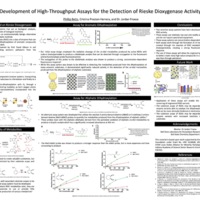Browse Exhibits (1 total)
Phillip Betts | Development of High-Throughput Assays for the Detection of Rieske Dioxygenase Activity

Rieske dioxygenases are a class of enzymes found in soil bacteria, that are known to catalyze aromatic compounds via dihydroxylation to form enantiopure cis-diol metabolites. The regio-/stereoselective nature of enzymes make it a promising tool for synthetic chemistry by discovering new methods to form complex compounds.
Enzymes can be an environmentally friendly alternative to traditional catalysts by eliminating the need for petroleum based solvents, as enzymes can perform in aqueous solutions, and toxic heavy metals. However, enzymes are limited by their substrate scope and strict selectivity. In order to overcome this, protein engineering has been employed to expand the reactivity of enzymes.
To detect the activity of engineered dioxygenases, a novel assay system for the detection of aromatic substrate metabolites was developed. Here, the cis-diol metabolite was oxidize to form dialdehydes. These aldehydes can then conjugate with a fluorescent probe to give a strong fluorescent signal. However, this metaperiodate fluorescein cis-diol assay (MPFCD) does not give a strong fluorescent signal with aliphatic substrates. Thus, optimization of an assay for aliphatic dihydroxylation for metabolite detection via absorbance was investigated. These throughput assays can allow for distinct determination of engineered Rieske dioxygenase variants that show improved reactivity towards substrates not native to the enzyme.
Faculty Mentor: Dr. Jordan Froese
Department of Chemistry
Undergraduate
